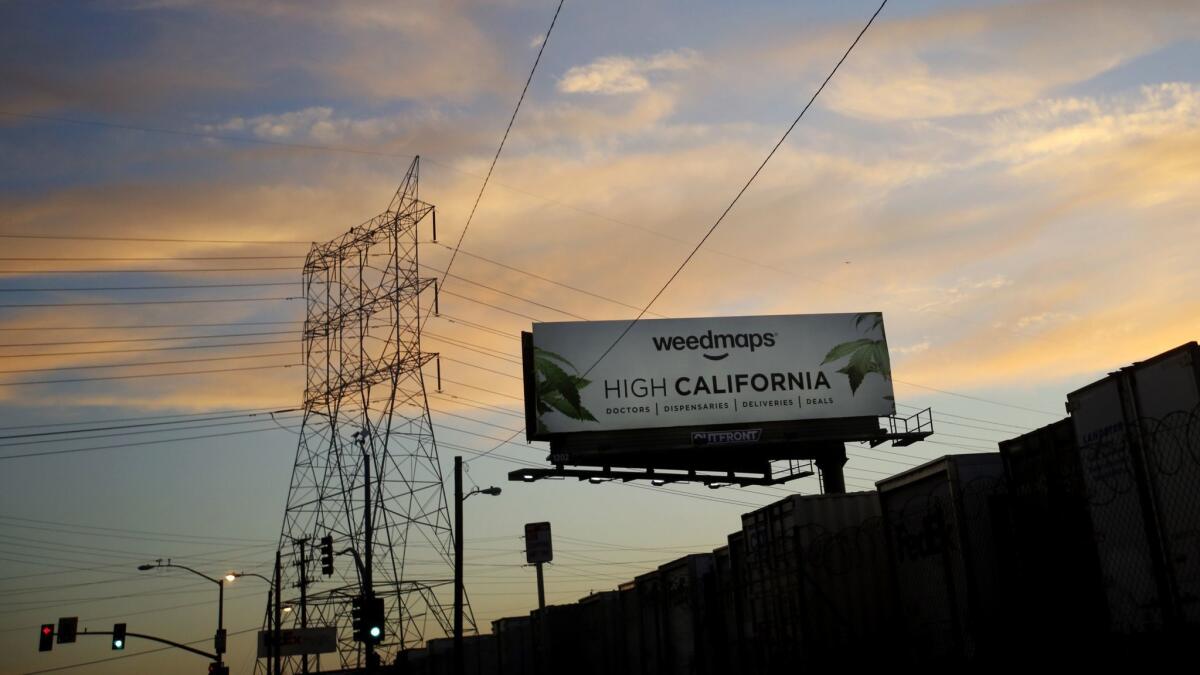Editorial:: Marijuana should be legal, but there are still good reasons to curtail pot advertising

California’s legal marijuana market is slowly growing, with more and more pot shops opening across the state to provide regulated and taxed cannabis to adult customers. But a new study raises questions about how many legal pot shops should be clustered in a community — and whether there should be more restrictions on marijuana advertising.
The study from the nonprofit Rand Corp. found that young adults aged 18 to 22 who live in Los Angeles County neighborhoods where there are more pot shops use marijuana more frequently than their peers in other L.A. neighborhoods. They also have more positive opinions on marijuana.
Furthermore, young people who lived near marijuana dispensaries that had storefront signs were still more likely to use marijuana and have good opinions of the drug, the study found. That was true even if the sign merely said “marijuana” or “pot” or had the symbol of a marijuana leaf or green cross.
The study suggests that both the prevalence and visibility of pot shops may influence the way young people perceive and use marijuana. It builds on earlier research from Rand that found that teenagers in Southern California were increasingly bombarded by pot ads. In 2010, 25% of teens said they had seen at least one medical marijuana advertisement during the previous three months; by 2017, 70% of teens had seen an ad. The teens who had seen the most ads were more likely to have used marijuana in the previous month and more likely to expect to use it again.
Tobacco companies are barred from advertising on billboards in California. But marijuana businesses can do so, with some exceptions.
None of this should be terribly surprising. Common sense alone tells you that ubiquitous advertising for marijuana — and reasonably easy access — will make it seem more normal and less risky, and could make people more inclined to use it.
That’s of particular concern because young brains are still developing until around age 25. Numerous studies have shown that when young people use marijuana — particularly if the use is frequent and the dose is potent — they can hurt their ability to think, learn and remember, and it puts them at greater risk of mental illnesses, such as depression and schizophrenia.
It’s much better to delay marijuana use until well into adulthood. And it’s a problem if the proliferation of highly visible retail cannabis shops in a community undermines that goal.
What’s the right response?
For one thing, lawmakers ought to enact stricter regulations on signs and advertising. Public health experts have long understood the powerful effect that advertisements can have on young people’s opinions and on their decisions. That’s one reason there are so many advertising restrictions on tobacco products; the hope is that minimizing children’s exposure to positive messages on cigarettes will discourage or delay them from smoking.
Enter the Fray: First takes on the news of the minute »
But lawmakers so far have been slow to take the same protective stance toward marijuana advertising and marketing. For example, tobacco companies are barred from advertising on billboards in California. But marijuana businesses can do so, with some exceptions on state highways and near schools and playgrounds.
The city of Los Angeles has adopted one of the more comprehensive marijuana signage laws, which limits the size of advertisements on shops and prohibits sandwich boards on the sidewalk and spinner signs. Yet the study suggests that even those regulations might not be enough.
There is a tension here. California voters legalized marijuana for adults, in part to eradicate the illicit underground market that sold to teens and had little regard for the protection of health and the environment. The state and cities have an interest in licensing marijuana businesses that will follow the rules and act responsibly.
But lawmakers also have a public health interest in dissuading young people from using marijuana. The study makes a good case for limiting the number of retail operations in communities and putting tighter restrictions on advertising.
Follow the Opinion section on Twitter @latimesopinion and Facebook
More to Read
A cure for the common opinion
Get thought-provoking perspectives with our weekly newsletter.
You may occasionally receive promotional content from the Los Angeles Times.






